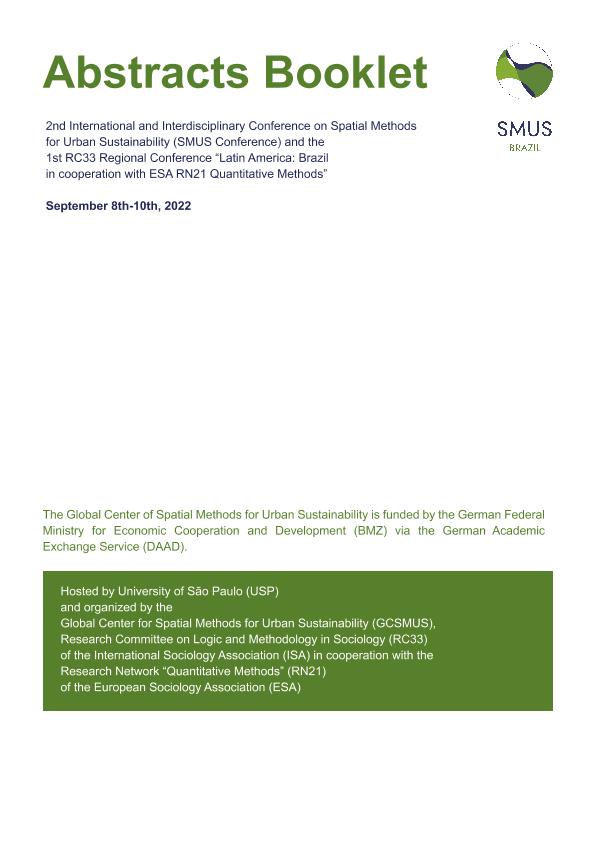Mostrar el registro sencillo del ítem
dc.contributor.author
Boccolini, Sara María

dc.contributor.author
Fenoglio, Valeria

dc.date.available
2023-11-06T11:48:58Z
dc.date.issued
2022
dc.identifier.citation
Mapping the Urbanization Impact on a Regional Ecosystem: Historical Cartography on Invasion-Succession of Ligustrum lucidum in the Chaco Forest of Metro Córdoba (2001- 2022); 2nd International and Interdisciplinary Conference on Spatial Methods for Urban Sustainability; 1st RC33 Regional Conference “Latin America: Brazil in cooperation with ESA RN21 Quantitative Methods”; São Paulo; Brasil; 2022; 156-157
dc.identifier.uri
http://hdl.handle.net/11336/217045
dc.description.abstract
The Sierras Chicas valley (Córdoba, Argentina) has faced for years the invasion of the native forest by the exotic species Ligustrum lucidum (glossy privet). This problem is directly related to the urbanization processes in the region, specifically to urban forestry strategies that promote the implantation of exotic species - especially Ligustrum - whose evergreen foliage contrasts with the deciduous flora of this semi-arid region. In recent years, the affected area has growth significantly, causing drastic changes in the local ecosystem: Ligustrum reproduces quickly and competes successfully with the native flora for water and sunlight, causing the loss of the native flora and fauna. Several studies record the evolution of this process since 1983; this is essential to calculate the magnitude of the problem and the affected area over time. However, its evolution in the 21st century has not yet been reconstructed, even when in these years Sierras Chicas shows an exponential increase in its population and urbanized area, which would indicate a growing aggravation of the problem. Due to this, we propose to complete the historical record of the area occupied by Ligustrum between 2001 and 2022. To do this, we processed Landsat 8 and 9 satellite imagery obtained during dry season (between July- September), when the foliage difference between native forest and Lucidum is most notable: we calculated the different levels of the Normalized Difference Vegetation Index in the territory, detecting both areas covered with Ligustrum and urbanized areas in 2001, 2006, 2010, 2016 and 2022 with great level of detail and reliability. The selection of temporary samples responds to obtaining data with a periodicity according to the dynamic condition of the problem and generates information synchronous to the national population censuses (2001, 2010 and 2022); we also work with hydrographic cartography and Digital Elevation Models, to identify trends linked to topographic and hydrographic conditions. Integrating these variables in a Multicriteria Matrix - through the use of GIS - allows us to integrate environmental, spatial, and socioeconomic variables to study the close relationship between invasion-succession patterns and urbanization patterns. Our approach reconstructs this problem as a complex and dynamic process, from which it is possible to infer medium-term development trends. Through this transdisciplinary analysis, a critical environmental process becomes a direct indicator of the capacity of urbanization to transform the landscape on a regional scale. This is strategic data, not only to develop more effective protocols to remedy the impact of the invasion on the native forest, but also to generate situated knowledge about the urban-environmental dynamics of (re)production of the regional landscape, promoting more sustainable regional policies.
dc.format
application/pdf
dc.language.iso
eng
dc.publisher
University of São Paulo
dc.rights
info:eu-repo/semantics/openAccess
dc.rights.uri
https://creativecommons.org/licenses/by-nc-sa/2.5/ar/
dc.subject
NDVI
dc.subject
LIGUSTRUM LUCIDUM
dc.subject
LANDSAT
dc.subject.classification
Ciencias Medioambientales

dc.subject.classification
Geografía Económica y Social

dc.subject.classification
CIENCIAS SOCIALES

dc.title
Mapping the Urbanization Impact on a Regional Ecosystem: Historical Cartography on Invasion-Succession of Ligustrum lucidum in the Chaco Forest of Metro Córdoba (2001- 2022)
dc.type
info:eu-repo/semantics/publishedVersion
dc.type
info:eu-repo/semantics/conferenceObject
dc.type
info:ar-repo/semantics/documento de conferencia
dc.date.updated
2023-10-30T11:44:48Z
dc.journal.pagination
156-157
dc.journal.pais
Brasil

dc.journal.ciudad
São Paulo
dc.description.fil
Fil: Boccolini, Sara María. Consejo Nacional de Investigaciones Científicas y Técnicas. Centro Científico Tecnológico Conicet - Córdoba. Centro de Investigaciones y Estudios sobre Cultura y Sociedad. Universidad Nacional de Córdoba. Centro de Investigaciones y Estudios sobre Cultura y Sociedad; Argentina
dc.description.fil
Fil: Fenoglio, Valeria. Consejo Nacional de Investigaciones Científicas y Técnicas. Centro Científico Tecnológico Conicet - Córdoba. Centro de Investigaciones y Estudios sobre Cultura y Sociedad. Universidad Nacional de Córdoba. Centro de Investigaciones y Estudios sobre Cultura y Sociedad; Argentina
dc.relation.alternativeid
info:eu-repo/semantics/altIdentifier/url/https://gcsmus.org/wp-content/uploads/SMUSBrazil_AbstractsBooklet.pdf
dc.conicet.rol
Autor

dc.conicet.rol
Autor

dc.coverage
Internacional
dc.type.subtype
Conferencia
dc.description.nombreEvento
2nd International and Interdisciplinary Conference on Spatial Methods for Urban Sustainability; 1st RC33 Regional Conference “Latin America: Brazil in cooperation with ESA RN21 Quantitative Methods”
dc.date.evento
2022-09-08
dc.description.ciudadEvento
São Paulo
dc.description.paisEvento
Brasil

dc.type.publicacion
Book
dc.description.institucionOrganizadora
Global Center for Spatial Methods for Urban Sustainability
dc.description.institucionOrganizadora
Research Committee on Logic and Methodology in Sociology
dc.description.institucionOrganizadora
International Sociology Association
dc.description.institucionOrganizadora
Research Network “Quantitative Methods”
dc.description.institucionOrganizadora
European Sociology Association
dc.source.libro
Abstracts Booklet “2nd International and Interdisciplinary Conference on Spatial Methods for Urban Sustainability" (“SMUS Conference”) and “1st RC33 Regional Conference – Latin America: Brazil”
dc.date.eventoHasta
2022-09-10
dc.type
Conferencia
Archivos asociados
